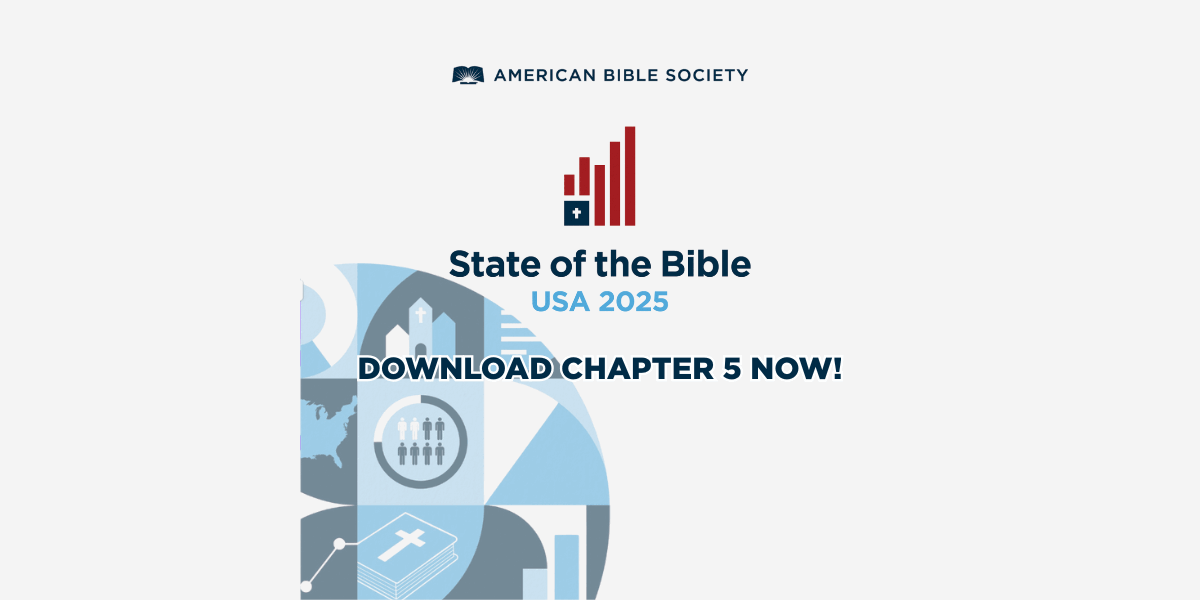American Bible Society today released the fifth chapter of their 15th annual State of the Bible report, which shares new data on U.S. Church Engagement and examines how factors such as personal interaction, attendance frequency, community size, generation, and denomination impact engagement levels. Additionally, it explores how Church Engagement impacts a person’s flourishing and well-being levels. The fifth chapter of State of the Bible: USA 2025 is available now for download at StateoftheBible.org.
State of the Bible defines Church Engagement as an individual’s holistic involvement in the life, mission, and community of a local church. This engagement is measured by five key indicators: having opportunities to use one’s giftings at church; feeling cared for by pastors or other church leaders; having someone in the church who encourages spiritual development; having a best friend at church; and having opportunities to learn and grow in faith over the past year.
“People’s lives improve when they engage with their church—not just attending, but using their gifts, developing relationships, and taking advantage of opportunities to grow spiritually,” says John Farquhar Plake, Chief Innovation Officer at American Bible Society and editor-in-chief of the State of the Bible series. “Our survey shows that church-engaged Christians have significantly less stress, less anxiety, less loneliness, and more hope. For years now, we’ve seen these same effects with Scripture engagement, but the church provides a living environment where these factors can play out. The pairing of church and the Bible is a powerful force.”
State of the Bible findings come from a nationally representative survey performed for American Bible Society by NORC at the University of Chicago, using their AmeriSpeak panel. The data came from 2,656 online interviews with American adults in all 50 states and the District of Columbia. Data were collected from January 2–21, 2025. To delve deeper into findings regarding Church Engagement, questions in this chapter were exclusively posed to those who identified as Christians and reported attending a Christian church within the past six months, representing 35% of the total survey group. This allowed for a detailed examination of subgroups within the data collection.
Key findings analyzed in Chapter 5: Church Engagement
- Gen Z has the lowest Church Engagement score, while Millennials outscore Gen X on several Church Engagement criteria (page 97). These scores indicate an opportunity for churches to help young people recognize and engage their giftings and to nurture their faith
- Only 1 in 5 of Gen Z respondents (ages 18–28) strongly agree they can use their gifts, compared to 1 in 3 across all other generations.
- Only 1 in 4 young adults strongly agree that someone in their church encourages their spiritual development, compared to 2 in 5 of every other generation.
- Only 1 in 3 Gen Z adults strongly agree they’ve had opportunities to grow in their faith in the past year, compared to almost half of all other generations.
- A majority of highly church-engaged individuals (62%) also experience the highest levels of human flourishing, with only 8% experiencing low flourishing (page 101). This strong correlation between Church Engagement and flourishing holds true across all levels of engagement: the less engaged someone is with their church, the less likely they are to experience high flourishing levels.
- Despite 64% of Americans considering themselves Christians, 45% of those do not attend church, while 55% have attended within the last six months (page 95). Within this group of church attenders, 34% attend weekly, 10% monthly, and 11% about twice per year.
- Most churchgoers (72%) primarily attend services in person. About one-eighth (12%) mainly participate online, while one-sixth (16%) engage about equally through a combination of both in-person and online attendance (page 105). Those who attend church in person are much more likely to strongly agree that they are learning and growing in their faith, that their pastor cares about them, that someone in their church is encouraging their spiritual development, and that they have opportunities to use their giftings.
- A vast majority (84%) of highly engaged churchgoers strongly agree that the message of the Bible has transformed their lives (page 108). Additionally, 90% of highly engaged churchgoers say that church leaders make the Bible relevant to their lives and encourage them to read the Bible (page 107).
Continuing monthly through December 2025, American Bible Society will release four additional chapters in the State of the Bible story. Upcoming findings include Gen Z and their identity development, trust in institutions and people, and behaviors toward friends and neighbors.
To download the fifth chapter of State of the Bible 2025, visit StateoftheBible.org.





